Sustainability
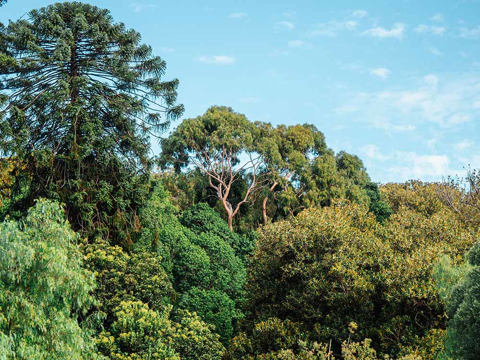
With the privilege of using the beautiful Botanic Park/Tainmuntilla comes a responsibility to look after this precious environment. Century-old Moreton Bay Figs and hundreds of other trees provide a canopy of shade on hot summer days, with vast lawns and endangered flora spreading over the 34-hectare park.
Adelaide Botanic Garden purchased the land for the park in 1866, with the stately avenue of Plane Trees planted in 1874 and the WOMADelaide Foundation has been presenting the festival in this extraordinary arboretum since 1992.
WOMADelaide takes great pride in doing as much as possible to protect the park (extreme weather conditions notwithstanding) and to return it to the Botanic Gardens in near-perfect condition. In 2013, WOMADelaide was the Winner of the Partnerships Project in the Premier's Natural Resources Management Award for our relationship with Greening Australia.
The WOMADelaide Forests
Since 2007 Greening Australia and WOMADelaide have been working together to measure the festival’s carbon emissions footprint, and plant carbon-storing native trees and shrubs to offset it.
This award-winning collaboration saw $3 from every ticket sold invested back into tree plantings to create native, biodiverse forests in regional South Australia.
As of the end of June 2024, the WOMADelaide forests now cover 109 hectares on Kaurna, Ngarrindjeri and Peramangk Country.
From the most recent plantings in 2024, Greening Australia concluded its 3 year collaboration with the Hills and Fleurieu Landscape Board , National Parks and Wildlife Services SA (NPWSSA) and the Friends of Newland Head Conservation Park to plant 3,500 plants at Newland Head Conservation Park. This partnership restored shrubland and woodland heath to help the endangered Mount Lofty Ranges Chestnut-rumped Heathwren and the critically endangered Beautiful Firetail Finch.
The WOMADelaide community’s contribution is making a noticeable difference even in young plantings, with bird species returning in growing numbers and increasing insect and plant diversity.
The largest planting site of 50 hectares is located near Langhorne Creek between the Ferries-McDonald Conservation Park and the Bremer River. This restoration site has now matured into a functioning mallee woodland, which at last count was supporting 70 bird species, including rare and threatened bird species like the Hooded Robin and Diamond Firetail.
Where To Next?
Greening Australia’s management of the WOMADelaide forests is ongoing and is expected to grow in the coming years to ensure that the carbon emissions from the festival continue to provide habitat for our unique Australian species.
Learn more about Greening Australia’s work around the country by visiting their website or even register your interest in hosting a WOMADelaide forest on your property.
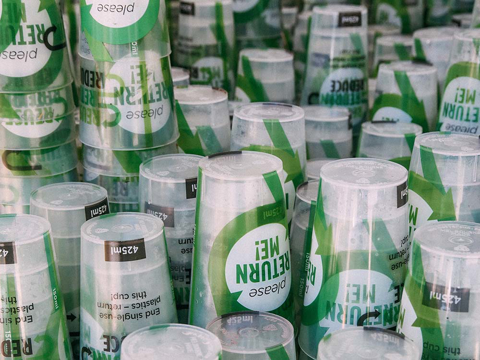
Reusable Cups: Reuse, Return, Reduce
Following the success of the initiatives to replace disposable bar cups with reusables, WOMADelaide has further reduced the use of single-use containers and increased the number of drinks sold in reusable cups.
In 2024, over 100,000 single use cups were prevented from entering the waste system. This site-wide project was facilitated by our dedicated WOMADelaide Cup Squad and supported by Bettercup.
Want to get involved with the 2025 Cup Squad?
Contact Sustainability Coordinator hugh[at]womadelaide.com.au
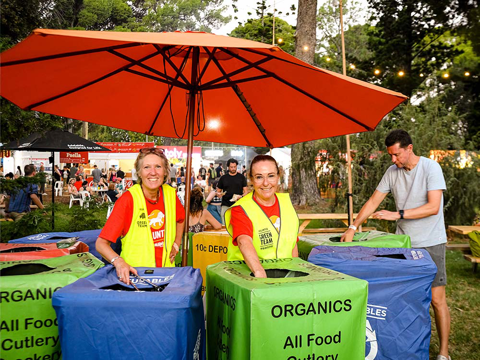
Waste Minimisation
To reduce reliance on plastic products and remove landfill items from being sold at the festival, we have taken the following steps.
Waste Management
WOMADelaide aims to be a completely zero-waste-to-landfill event, currently diverting 97.4% of all waste away from landfill (as of 2024).
In 2001 WOMADelaide was the first major event in Australia to adopt a waste management strategy that meant only biodegradable and recyclable wastes were produced by festival goers - this included cups, plates, crockery, serviettes and any items sold in packaging. In 2009, the three bin system that can now be seen at many other festivals was implemented, and in 2015 we upgraded our requirements to mandate that only compostable cups, utensils and packaging was used.
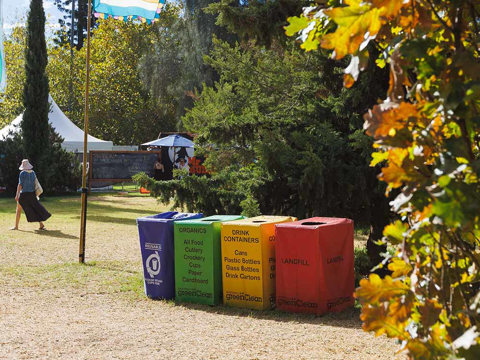
Sustainable waste management is an important part of the festival’s operating considerations with WOMADelaide’s waste management program being coordinated by Australian Green Clean, market leaders in the delivery of high quality and environmentally sustainable cleaning and waste management.
Working in partnership with SITA and Jeffries, Australian Green Clean provides a ‘zero waste’ solution to WOMADelaide by diverting waste away from landfill and into a sustainable pathway, including hand-sorting of waste on-site as required.
All organic waste generated at WOMADelaide is mulched by Jeffries, treated for composting and delivered back to and used by the Botanic Gardens.
Jeffries provides this mulch free of charge. In recent years we have been able to return up to 16 tonnes of composted green waste from the festival as organic mulch for use by the Botanic Gardens.
The WOMADelaide Green Team is on-hand throughout the festival to help educate and direct patrons on our waste streams and recycling efforts.
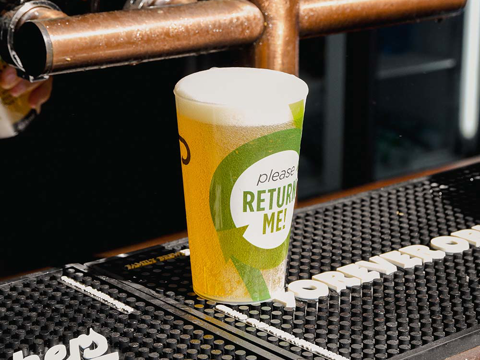
Bars
WOMADelaide instituted the use of fully compostable cups at all bars in 2014, and in 2018 the festival moved to providing re-usable cups and water bottles at all bars to engage in circular economy practices. Each cup is designed to be re-used as much as possible and collected at the end of the event to be used at the next festival (or other festivals and events across the country), as we try to move further towards a waste-free, circular economy. In 2020, we also eliminated entirely the sale of single-use plastics in the form of PET plastic drink bottles from our participating stallholders and vendors.
SA Water’s Bring Your Own Water bottle (BYOB) were made available for sale for $5 at concession stands at WOMADelaide and the SA Water Mt Isla caravan. With 100% of the water bottle sale proceeds donated to Foodbank SA & NT, in turn feeding 10 people in need for each bottle sold.
Over the four days, there were enough funds raised to help to put more than 24,560 meals on the table of those in need.
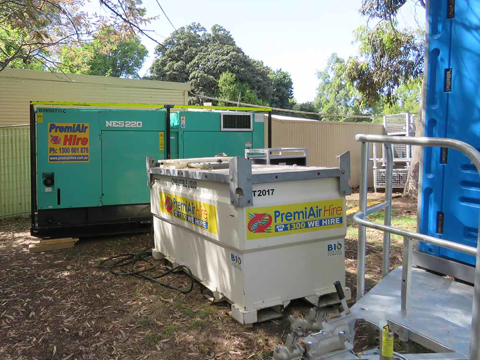
BioFuels at WOMADelaide
Following on from successful proof-of-concept trials at WOMADelaide in 2021 and 2022, the festival is rolling out the large scale use of B100 (biodiesel) for on-site power generation to continue to transition away from the use of fossil fuels.
B100 is an alternative fuel that is made entirely from organic matter, such as food waste, with zero mineral diesel.
In 2024, approximately 75% of WOMADelaide’s on-site power generation was fuelled by B100, in partnership with Refuelling Solutions.
The success of the proof of concept trials demonstrates that the outdoor events sector can reduce its reliance on fossil fuels and continue to lower their total emissions. This project was the first time in South Australia that a large-scale outdoor event has used 100% biofuel to reduce fossil fuel usage and cut down emissions.
Smoke-Free
WOMADelaide has been smoke-free since 2017
Bike Parking
WOMADelaide encourages patrons attending the event to ride a bike. Parking is made available for patrons adjacent to each entrance.
Help Us Look After The Park
Botanic Park is the ‘green heart’ of Adelaide / Tarntanya – 34 hectares of century old trees, vast lawns and endangered flora. WOMADelaide is in the enviable position of having the privilege to stage the festival on these grounds.
Please do not climb on the trees, hang anything from the branches or damage other flora.
Cable Ties
Where possible, we use alternatives to disposable cable ties including re-usable ties which were introduced and increased since trailing them at WOMADelaide 2019.
ACE Outdoor Board
In 2023, WOMADelaide introduced ACE Outdoor board to the Festival site. ACE outdoor is a 100% compostable product and used for signage requirement related specifically to each year (eg bars, site artists, ticketing / FOH). Where possible we still continue to retain wayfinding and site signage for several years.